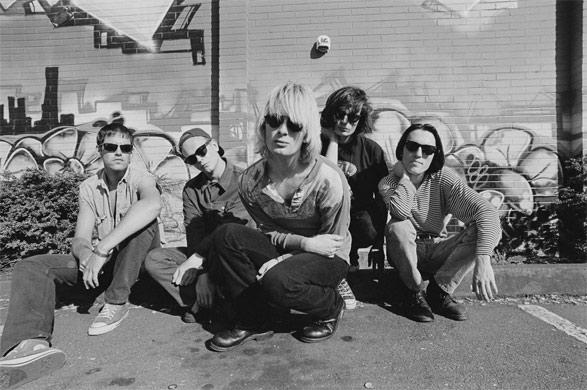The Radiohead Model, Chapter 1: Anyone Can Play Guitar

*MP3: Radiohead - "Anyone Can Play Guitar"
*MP3: Radiohead - "Creep"
*MP3: Radiohead - "Stupid Car"
In 1985, a group of 15 and 16-year-old boys began rehearsing songs in the music room on Fridays at Abingdon School in Abingdon, Oxfordshire, England. They called themselves On A Friday. Soon, On a Friday began appearing in pubs and bars around Oxfordshire and attracting attention. The boys kept rehearsing through college and reconvened in the early '90s, upon completing their degrees, to record the music they had begun to shape before securing their educations. By that time, Johnny Greenwood had moved up from keyboard player to lead guitarist, and brother Colin casually handed a demo to an EMI executive at the record shop where he worked. It was the 90s, so the band inked a six-album deal, but EMI wanted a name change. The boys remembered a favorite Talking Heads song (track six from “True Stories”) and in 1992, Radiohead released the Drill EP.
It was too easy, of course. Drill failed, and the subsequent Pablo Honey LP would only have success after a relentless touring schedule, which almost tore the band apart. Still, Britain reacted tepidly; NME said Radiohead were "a lily-livered excuse for a rock band” (I know, right?) and America only seemed to care about “Creep.” Radiohead played Pablo dry, saw little return but for a song that they came to hate, and were glad to be rid of the mess when they began sessions for the My Iron Lung EP in 1994. The Bends would be soon to follow. Pablo Honey, meanwhile, remained a commercially and artistically difficult beginning.
[Pablo Honey, meanwhile, remained a commercially and artistically difficult beginning.]
Yet no matter the amount of derision aimed at Pablo Honey in hindsight, it's very importance lies in that it was only a beginning. Fortune, hard work, and some might say destiny gave Radiohead the chance to record their first album, but inexperience and a fickle market gave them a hit song and a more modest first record. Radiohead matured on record, not before it. They began to wrap their heads around what they were capable of in the studio and that foundation led to desire to experiment within that context in the future (OK Computer, cough).
They were also not burnout-ready rock stars. They were polite English boys with mannered educations who liked to make un-polite sounds with musical instruments. They were art school students who understood the need for art to be advanced, to find further expression and better the self. They formed a tight-knit managerial and artistic collective around Radiohead to achieve their goals, which still exists to this day. It also didn't hurt that they had the long-term financial backing of then still mighty EMI.
So Pablo Honey sucks, right? Maybe. But it did give five boys from Abingdon the chance to be the most essential band of their time.
*This is the first installment of a life-long case study on Radiohead and their influence on modern music and the music industry. We will be publishing a new edition every week.
(Erik Martz/Ian Anderson)
Labels: The Radiohead Model.

3 Comments:
Wow. Way to take things I was trying to say when I covered Radiohead last week on my site's Album A Day, and do it far more effectively than I could. Thank you for taking my ideas and making them make sense. Kudos, and look forward to hear more.
==TJ==
This is an awesome idea for a weekly segment. Long live Radiohead.
This is how to do short but in-depth. Looking forward to see the next chapter, when you'll be reaching the point where I climbed on the RH bandwagon when no one around me knew anything about them (I live in Greece, it was 1996) declaring that "these guys are going to be huge and soon too expensive for us to ever bring them here for a concert" (I was wrong there, they came in 2000 but the ticket did indeed cost a fortune). I sort of expected them to be as huge, as universally loved (or loathed) as they are now, but not the way it's happened. And I enjoy it big time. :-)
Post a Comment
<< Home